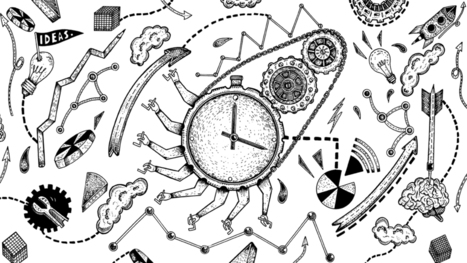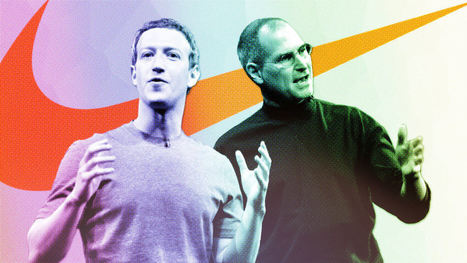 Your new post is loading...
 Your new post is loading...
If you want to hold brainstorms that unearth better, more creative ideas, it all starts with the number of people in the room. That’s my first tip for you: Follow the “pizza rule” for brainstorming. If you’re unfamiliar with the “pizza rule,” it’s the idea that if you have more people in a room than you could feed with a pizza, there are too many people in that room to hold a productive meeting. The same rule goes for a brainstorming session: If you’ve got a dozen people sitting around a table, expect a really long list of truly mediocre ideas. So, what else can you do other than bribe a group of two to six people with pizza to unearth good ideas? So glad you asked.
Via The Learning Factor
Running a successful organization requires lots of moving pieces running smoothly in tandem. At the heart of every organization are people just like you and me, whose performance can be influenced in a positive direction. Recently, companies like Google and Facebook have been redefining the standards of workplace culture, and in turn seeing improvements in employee satisfaction and company performance. Now, your company might not be large enough to have a dedicated HR (or “People Ops”) department, but there are some exciting takeaways from social psychology that you can apply to benefit your business. Reciprocity Principle Reciprocity is one of the famous “Six Principles of Persuasion” defined in Robert B. Cialdini, Ph.D.'s book, Influence: The Psychology of Persuasion. The idea is that we feel pressure to repay others for what they have given us or done for us. We often even give back more than we were initially given to minimize any guilt associated with the initial favor. Founders and CEOs can use this to their advantage. Internally, this can help improve or repair work relationships, win over co-workers and build consensus. As Dr. Cialdini writes, reciprocity is so powerful that it can overcome feelings of suspicion or dislike toward the person who gives the gift or favor. As a small business owner, how about giving gifts or bonuses on holidays or birthdays? You could also offer to bring back coffee for the office or surprise your colleagues with breakfast or lunch. A kind gesture can go a long way. Outside the office, the reciprocity principle can help you succeed in negotiations, build valuable business partnerships and win over investors — or even customers! When we launched our product and were at our first trade show full of retail managers and buyers, we realized that people only stopped at our booth if we handed them a free sample. So we handed samples to everyone who walked by! In turn, they stopped, listened to our pitch, and 99% of the time they placed an order for their store. In those first few hours, we sold over 100 cases into 100 new stores.
Via The Learning Factor
hen it comes to our daily schedule, most people fall into one of two camps: The over-scheduler: Their calendars look like a kindergartener’s finger painting. Meetings overlap meetings while reminders for events, breaks, tasks, and more meetings are going off like it’s New Year’s Eve. Their days are determined from the moment they wake up to their evening routine. The minimalist: Also known as “The Dreamer.” They’ve got one or two recurring events, but a whole lot of whitespace so they’re “free” (at least on paper) for long stretches of work. The problem is that both of these are terrible. For their own reasons. Being over-scheduled leaves us no time for ourselves. The more “in control” we are of our calendar, the less control we feel like we have over our lives. Not to mention we’re notoriously bad at knowing how long tasks take us to do. When your schedule is this jammed, even going 15 minutes over on your morning task will throw your whole day out of whack. And the minimalist? Well, they’re just living in la la land, aren’t they? They’ve offloaded their schedule to some other format–most likely a to-do list, scheduling app, or series of angry emails asking “Where is this?” A good daily schedule is a blueprint for a successful life. Knowing what we’re doing and when empowers us with a sense of purpose, meaning, and focus.
Via The Learning Factor
What are the defining attributes of great leaders? That's the age-old question thought leaders and scholars galore have been attempting to answer in mountains of books and literature. While great leadership, to an extent, can be personal and subjective to the follower, there are universal principles you can't argue with (but you can try). Speaking of those thought leaders and scholars, here are six traits that keep surfacing over and over again in the leadership literature and best-sellers. 1. They challenge their own assumptions. Great leaders may be smart and know a lot, but they are humble enough to recognize there are smarter people in the room that they can learn from. They don't restrict themselves from opinions and input outside of their own. They surround themselves with diverse perspectives to help them answer questions like, "How do I know my decision is the right one?" or "Is there a better course of action here?"
Via The Learning Factor
To make a good decision, you need to have a sense of two things: how different choices change the likelihood of different outcomes and how desirable each of those outcomes is. In other words, as Ajay Agrawal, Joshua Gans, and Avi Goldfarb have written, decision making requires both prediction and judgment. But how do you get better at either? We’ve published volumes on this subject —here are a few of my favorites — but there are three rules that stand out. Following them will improve your ability to predict the effects of your choices and assess their desirability. Rule #1: Be less certain. Nobel-prize-winning psychologist Daniel Kahneman has said that overconfidence is the bias he’d eliminate first if he had a magic wand. It’s ubiquitous, particularly among men, the wealthy, and even experts. Overconfidence is not a universal phenomenon — it depends on factors including culture and personality — but the chances are good that you’re more confident about each step of the decision-making process than you ought to be. So, the first rule of decision making is to just be less certain — about everything. Think choice A will lead to outcome B? It’s probably a bit less likely than you believe. Think outcome B is preferable to outcome C? You’re probably too confident about that as well. Once you accept that you’re overconfident, you can revisit the logic of your decision. What else would you think about if you were less sure that A would cause B, or that B is preferable to C? Have you prepared for a dramatically different outcome than your expected one? You can also practice aligning your level of your confidence to the chance that you’re correct. Try out quizzes like this one or this one. You’ll realize that while it’s not possible to always be right, it’s totally possible to become less overconfident.
Via The Learning Factor
Regardless of your job or industry, there aren't always enough hours in the day to get everything done. As a result, you constantly feel like you're always behind. And that's just not good for your productivity or your health. So, what's the answer? Work more hours? Not necessarily. As Bob Sullivan explained on CNBC.com, "Research that attempts to quantify the relationship between hours worked and productivity found that employee output falls sharply after a 50-hour work-week, and falls off a cliff after 55 hours -- so much so that someone who puts in 70 hours produces nothing more with those extra 15 hours, according to a study published last year by John Pencavel of Stanford University." Instead of putting in those extra hours, you can become more effective at work by focusing on what really matters. And you can get started with that ASAP by following these ten simple tips.
Via The Learning Factor
There’s a lot of discussion about what makes a person successful. Some say it’s the people you know or your network. Others say it’s all about how you organize your day and your priorities. Others say it’s innate personality characteristics. All of the things listed above are extremely important. And, we wanted to know what really creates true greatness in people—where their work is so good that they win awards for it.
Via The Learning Factor
Behind every great athlete there is an even greater coach. There isn't a top athlete--from Muhammad Ali to Tiger Woods to Serena Williams--who did not need a mentor to help them reach the top of their profession. If you think about it, your business is similar to that of an elite athlete. You may have the drive, the skills, and the vision, but there are times when you need professional guidance to ensure you stay on the right path, and how to best utilize your talents and work on your shortcomings in order to reach your goals. An executive coach can be that person. No matter where you are on your career path--from eager up-and-coming manager to a seasoned senior executive to an entrepreneur--there will be times when you can benefit from some professional coaching.
Via The Learning Factor
What do people want out of work? More than money, more than benefits, much more than job security, a recent survey says, they want to be treated with respect. If that sounds like you, how can you increase the respect you get each day at work? It turns out that there are specific habits you can cultivate that allow you to train the people you work with to treat you respectfully each day. Here are 33 of these proven habits that can help, if you're willing to stick with them. Implement a few, take inspiration from the others, and you'll likely see dividends quickly.
Via The Learning Factor
Tis the season for stress. The holidays are crazy enough, but add in year-end deadlines and sales goals, performance reviews, and the news of yet another raise not given, and you can already feel your blood pressure rise. But there’s good news: You can still stay healthy, even when work is insane. It’ll just take a little extra effort. “When stress takes over, often the first things to go are the ones we need the most–sleep, water, exercise, whole nutritious foods,” laments nutritionist Brigitte Zeitlin. “And that can actually compound the issue, leaving you less equipped to handle the stress well.” Here’s exactly what you can do to keep that from happening before work gets really crazy.
Via The Learning Factor
If you’re always working for the weekend, you’re not alone. Just one-third of employees are actively engaged at work, leaving the majority of us unhappy on the job, according to the most recent State of the American Workplace Gallup poll. Instead of keeping an eye on the clock and the calendar, take the reins by creating a career that you love, experts suggest. “People often find themselves on a lifelong career journey without a destination in mind, only to look back at some point and realize they are not where they expected or wanted to be professionally,” says Tom Kemp, MBA executive-in-residence at the University of Richmond’s Robins School of Business. “Often this reflection happens when they either find themselves confronted with a job loss or they simply become so disenfranchised that they quit with little idea or thought about what they want to do next.”
Via The Learning Factor
As leaders, most of us would like to imagine that we have all the answers. But we’re constantly faced with new and disruptive challenges that we have no idea how to solve. As we turn to our teams to help us develop innovative solutions, there’s nothing more disappointing than seeing them come back to you with mediocre ideas and lackluster execution. It’s not that your team is wrong. It’s just that they are stuck in the loop of status quo. So, as a leader, you crave new talent with new ideas to drive your team forward. The good news is that the problem may not be that your team doesn’t have the ability to step up to the shifting challenges and expectations of leadership. Instead, you may just need to find a new way to unleash the leadership promise they already have. This means bringing the untapped potential of individuals and teams to the surface, activating it and accelerating development through opportunities and exposure. Here are some of the ways you might be overlooking potential on your team:
Via The Learning Factor
Some people just seem to bounce back from whatever life throws at them. Whether it’s illness, loss, or tragedy, they do the tough work of picking themselves up, dusting themselves off, and carrying on—even when it seems impossible. If you’ve ever thought, “I could never do that” when looking at one of these apparent “superheroes,” don’t be so sure. It’s actually possible to build resilience to make yourself better able to bounce back from even the most difficult times. “It’s the ability to get back in the game after you’ve had some sort of failure. And indeed, we can learn to become more resilient,” says social scientist and leadership expert Frank Niles, PhD. Niles says there are a number of science-backed areas people can address to help them be more resilient. Here are some ways you can shore up your “resilience bunker” to better prepare for when tough times strike.
Via The Learning Factor
|
Traditional goal setting focuses on the beginning and the end—start strong and keep your eye on the prize. Unfortunately, that process doesn’t work for every kind of goal, says Scott Young, author of How to Change a Habit. “A lot has been taught around the classic self-help style of Zig Ziglar or Tony Robbins where you have a clear goal, you visualize it, write it down, and focus on the starting point,” says Young, cofounder of the career development course Top Performer. “Some goals, though, aren’t clearly sequential.” The middle can and should be your starting point when you’re setting a goal where you’re unclear of the level you can achieve within a particular timeframe. This is especially the case with daunting, unfamiliar goals where you don’t yet have a strong sense of the big picture.
Via The Learning Factor
You’ve probably experienced the frustration of being distracted at work. Perhaps you were pulled into a never-ending Slack discussion, and when it finally ended you struggled to focus on the task you were working on. Or a coworker criticized you, and now you can’t stop replaying his comments in your head. It’s totally normal to lose focus after a period of time (which is why you should be taking regular breaks). But if you find yourself easily distracted throughout the day, you might want to consider tweaking some of your morning habits. They probably won’t eliminate all distractions, but you’ll at least start your workday strong building a good foundation for the rest of the day.
Via The Learning Factor
Advice on how to improve one’s self is everywhere. It accounts for about 2.5% of all book sales in the United States. Add in speeches, training programs, TV programs, online-products, coaches, yoga, and the like, self-help is a $10 billion industry per year, and that’s just in the U.S. However, research shows that much of the advice extolled may be misleading or even wrong. Several myths about performance persist, despite research and practices that show they are half-truths at best. That might explain why the most likely purchasers of self-improvement books have bought another within the previous 18 months. The first myth-riddled book didn’t work, so they bought another, and maybe another soon after. A recent report in the Journal of Management noted that of nearly 25,000 academic articles on performance, only a fraction include what psychologists call within person variance, which describes ranges, such as that between individuals’ top, average and worst performances. Advice too often mistakenly assumes performance can be compared across people, using the same gauge. That’s absurd. Our observation of hundreds of performance seekers largely confirms the report and has led to delineating a series of myths that hold people back when trying to improve. These assertions are based on a diverse set of fields, including psychology, sports, arts, and leadership. We hope that by dispelling these myths, explaining the reality and offering some sound advice instead, we can help move people toward more effective personal development.
Via The Learning Factor
Mazin Gilbert has an ambitious goal. As vice president of advanced technologies at AT&T, Gilbert wants to make AI technologies widely available throughout the corporation, especially to those who might not have a computer science background and may not even know how to program. Call it the “democratization of AI.” To accomplish that goal, AT&T is building a user-friendly platform with point-and-click tools that will enable employees — up to one-quarter of the company’s workforce — to build their own AI applications. AT&T and a host of other companies are trying to address a crucial issue in business: the severe shortage of AI talent. According to some estimates, only about 10,000 programmers in the world have the necessary expertise to develop advanced AI algorithms. But that’s barely a drop in the bucket for what companies will need in their future workforces. Tools like AT&T’s platform will help spread AI technologies well beyond just a limited number of “haves” and reach the “have nots” that may lack the technical knowledge and experience. This democratization of AI will happen in two ways. First, it will enable employees across a large organization like AT&T to develop their own AI applications to make them better at their jobs. But it will also allow smaller firms to deploy some of the same AI capabilities that have heretofore been limited to large corporations. Think of how spreadsheets like Lotus 1-2-3 and Excel helped democratize data analysis, enabling even mom-and-pop shops to perform invaluable “what-if” analyses.
Via The Learning Factor
Here’s a grim stat: More than half of your staff is ready to leave the company, finds a recent Gallup poll. Vacancies impact the productivity and bottom line of your company, but a survey from Globoforce’s Work Human Research Institute uncovered a reason people stick around. When asked the question, “What makes you stay at your company?” the number-one answer, representing 32% of respondents, was, “My job–I find the work meaningful.” “Having a personal sense of meaning in one’s work was even more important than compensation, which ranked as the third most important reason for staying,” says Eric Mosley, CEO of Globoforce, a talent engagement software provider. The trick is that meaning means different things to different people, says Becky Frankiewicz, president of the staffing and talent management provider ManpowerGroup North America. “Our NextGen Work research found that Boomers value being appreciated and recognized, younger people look for purposeful work that contributes to society, while people of all generations desire work that allows them to improve their skills and balance work and home,” she says. “Taking the time to find out what motivates your people individually is the first step to helping them find meaning in what they do.”
Via The Learning Factor
If last year felt like a never-ending avalanche of shocking headlines, push notifications, and crises to react to–plus a big heaping spoonful of mindless distractions dumped on top of all that–well, you aren’t alone. By the close of 2017, some of the most productive CEOs out there told me they’d developed some bad habits as a result of a particularly hectic year. These are some of their top issues, and how they’re planning to cope with them over the next 12 months. BAD HABIT NO. 1: LISTENING WHILE DISTRACTED For Porter Braswell, CEO of diversity hiring platform Jopwell, communicating with others fell victim to the curse of multitasking. We’re all guilty of that once in a while–say, by reading the news, perusing social media, or sending emails during meetings. But Braswell says he’s working especially hard to keep his one-on-one interactions with other people free of those distractions this year. “When I left my job in finance to start Jopwell,” he recalls, “a close mentor of mine gave me a lot of great leadership advice: Always make sure you give your team your full and undivided focus, no matter how hectic it can feel to run a startup. Putting your phone away and ignoring your email for a half-hour while you meet with someone can make a big difference in that person’s experience working with you,” Braswell says. If offering your undivided attention is getting harder than it used to be, that’s all the more reason to commit to it.
Via The Learning Factor
We thought 2016 was a year of turning points. But we had no idea how 2017 would shape up to hold far more moments that affected the workplace, from the current administration’s changing positions on labor policy issues, to whistleblowers sounding the alarm on sexism, racism, and other unfair practices, to the shifting demographics of the workforce itself with the first members of gen Z making their entry into full-time employment. Here is a look at some of the more significant trends that will continue to dominate the conversation around work in 2018.
Via The Learning Factor
If you’re constantly frazzled on the job, logging super-long hours with little to show for it at the end of the day, chances are good that you’re mismanaging your time. But the good news is it’s easy (enough) to reorganize your schedule and get back on a successful track, stat! “There’s a lot coming at us: mail–and [all kinds of] paper in general–emails, texts, phone calls, bosses calling for help, deadlines, projects–it doesn’t stop,” points out Felice Cohen, organizer and author of 90 Lessons for Living Large in 90 Square Feet (or More). No wonder so many of us get so behind and feel so exasperated. But it doesn’t have to stay that way. The answer isn’t to do more. “Not everyone can multitask, and most of us who do probably shouldn’t,” says Cohen. Rather, the answer is to do what you do smarter. And here’s how.
Via The Learning Factor
You’re sitting there at your desk with a pit in your stomach. You know you really blew it–and your boss does, too. Maybe you forgot to follow up with an important client and they chose someone else’s proposal. Maybe you didn’t prepare the right documents in time for a super-important meeting. Or a careless typo you made on a spreadsheet or purchase order led to an expensive mistake. Whatever it is, your boss isn’t happy. That’s the bad news. The good news is that you don’t need to start job-searching. In fact, there are a few simple steps you can take right away to rebuild the trust you’ve lost–as quickly as humanly possible. Here’s what to do and when to do it.
Via The Learning Factor
We all want to learn and grow. Improving our skills and being exposed to new ideas not only makes us better at our jobs but makes us happier and more engaged at work. But with a full-time job, it can be tough to find the time and resources to dedicate to personal development. Some people, like me, are lucky to work for companies that encourage and even fund classes, sabbaticals, or fellowships. But if you work for a company that doesn’t have an official policy, how can you make the case to your manager (and the necessary higher ups) to support you?' Identify how you want to learn and grow. If you don’t yet have a clear picture of what you want to develop, spend time honing in on exactly what you need. Do you want to build your emotional intelligence skills to be a more attuned business leader? Are you interested in going on a yoga or meditation retreat? Set aside a specific period of time, such as one evening or even a week, to explore ideas and research what appeals to you. Write down what you want to learn and how you would grow from the experience you’ve identified. Research shows that the physical act of writing has a neurological effect on the brain which tells the cerebral cortex to “wake up and pay attention.” Writing stimulates a bunch of cells in the brain called the Reticular Activating System that plays a key role in being more conscious and alert. The more you can write down, the more aware and real your ideas become.
Via The Learning Factor
Let’s not waste any time. The simple solution that we’re all looking for: It doesn’t exist. Want your business to thrive like Amazon’s? Want to emulate Steve Jobs or Mark Zuckerberg? Follow the road map of Nike or Warby Parker to build the next brand that matters? Sorry, it doesn’t work that way. What succeeded for them may not work for you. Too bad. Get over it. One-size-fits-all strategies just aren’t effective in today’s age of flux (and maybe they never were). That’s one of the insightful messages in senior writer Austin Carr’s feature The Future of Retail in the Age of Amazon. It’s become common practice to refer to billion-dollar startups as “unicorns,” but there is no more one-of-a-kind business than Amazon: hard-driving, customer-focused, yet broadly directed, from books and groceries to entertainment, consumer electronics, and web services. Carr explains that competing with Amazon today–trying to beat it at its own game–is largely a fool’s errand. Instead, what increasingly defines retail success, and points the way toward the businesses of tomorrow, is a bespoke model, one that is crafted to deliver on a focused need, proposition, or brand essence.
Via The Learning Factor
The world's top companies are starting to manage employee energy like a strategic asset. They know that ever-increasingly pace of change requires more and more human energy.Any entrepreneur will tell you that it take a tonne of energy to grow a business. The key is to manage it; sometimes you have to exert energy, other times you need to conserve it to go the distance, and after a sprint you need to replenish it. A group of senior executives from companies like Facebook, Alibaba, IBM and Johnson & Johnson got together to come up with strategies to better manage collective human energy in their companies. Here are their top five hacks to maximise human energy:
Via The Learning Factor
|



 Your new post is loading...
Your new post is loading...




















































As a High D/I on the DiSC model I've always loved a good brainstorming session. Nice little article to get you thinking and perhaps change things up a little in the boardroom. Also check out Edward De Bono's 6 Thinking Hats book - fast and effective way to problem solve involving brainstorming that you might also like to read. Have a great week ahead.
Squashing bad ideas could lead people to fear speaking up, missing out on good ideas as a result. But if you’re giving every idea equal due regardless of merit, then you get off-track real fast and end up down a bad idea rabbit hole.